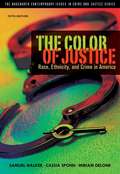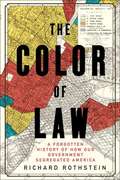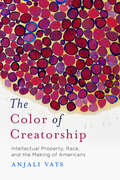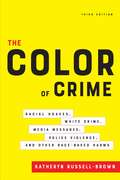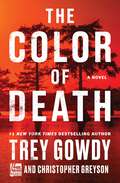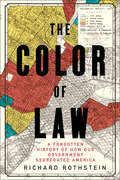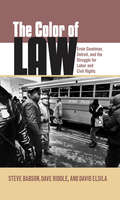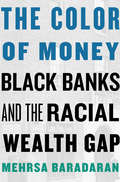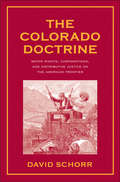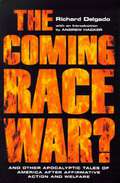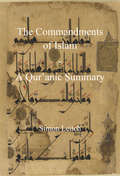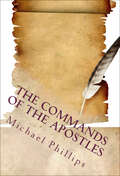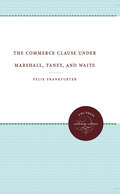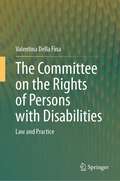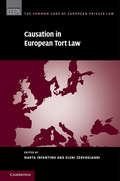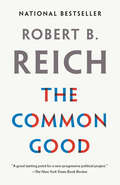- Table View
- List View
The Color Of Justice: Race, Ethnicity, And Crime In America
by Samuel Walker Cassia Spohn Miriam DeloneComprehensive and balanced, THE COLOR OF JUSTICE is the definitive book on current research and theories of racial and ethnic discrimination within America's Criminal Justice system. The best and the most recent research on patterns of criminal behavior and victimization, police practices, court processing and sentencing, the death penalty, and correctional programs are covered giving students the facts and theoretical foundation they need to make their own informed decisions about discrimination in the system. Uniquely unbiased, THE COLOR OF JUSTICE makes every effort to incorporate discussion of all major race groups found in the United States
The Color Of Law: A Forgotten History Of How Our Government Segregated America
by Richard RothsteinIn this groundbreaking history of the modern American metropolis, Richard Rothstein, a leading authority on housing policy, explodes the myth that America's cities came to be racially divided through de facto segregation--that is, through individual prejudices, income differences, or the actions of private institutions like banks and real estate agencies. Rather, The Color of Law incontrovertibly makes clear that it was de jure segregation--the laws and policy decisions passed by local, state, and federal governments--that actually promoted the discriminatory patterns that continue to this day. Through extraordinary revelations and extensive research that Ta-Nehisi Coates has lauded as "brilliant" (The Atlantic), Rothstein comes to chronicle nothing less than an untold story that begins in the 1920s, showing how this process of de jure segregation began with explicit racial zoning, as millions of African Americans moved in a great historical migration from the south to the north. As Jane Jacobs established in her classic The Death and Life of Great American Cities, it was the deeply flawed urban planning of the 1950s that created many of the impoverished neighborhoods we know. Now, Rothstein expands our understanding of this history, showing how government policies led to the creation of officially segregated public housing and the demolition of previously integrated neighborhoods. While urban areas rapidly deteriorated, the great American suburbanization of the post-World War II years was spurred on by federal subsidies for builders on the condition that no homes be sold to African Americans. Finally, Rothstein shows how police and prosecutors brutally upheld these standards by supporting violent resistance to black families in white neighborhoods. The Fair Housing Act of 1968 prohibited future discrimination but did nothing to reverse residential patterns that had become deeply embedded. Yet recent outbursts of violence in cities like Baltimore, Ferguson, and Minneapolis show us precisely how the legacy of these earlier eras contributes to persistent racial unrest. "The American landscape will never look the same to readers of this important book" (Sherrilyn Ifill, president of the NAACP Legal Defense Fund), as Rothstein's invaluable examination shows that only by relearning this history can we finally pave the way for the nation to remedy its unconstitutional past.
The Color of Creatorship: Intellectual Property, Race, and the Making of Americans
by Anjali VatsThe Color of Creatorship examines how copyright, trademark, and patent discourses work together to form American ideals around race, citizenship, and property. Working through key moments in intellectual property history since 1790, Anjali Vats reveals that even as they have seemingly evolved, American understandings of who is a creator and who is an infringer have remained remarkably racially conservative and consistent over time. Vats examines archival, legal, political, and popular culture texts to demonstrate how intellectual properties developed alongside definitions of the "good citizen," "bad citizen," and intellectual labor in racialized ways. Offering readers a theory of critical race intellectual property, Vats historicizes the figure of the citizen-creator, the white male maker who was incorporated into the national ideology as a key contributor to the nation's moral and economic development. She also traces the emergence of racial panics around infringement, arguing that the post-racial creator exists in opposition to the figure of the hyper-racial infringer, a national enemy who is the opposite of the hardworking, innovative American creator. The Color of Creatorship contributes to a rapidly-developing conversation in critical race intellectual property. Vats argues that once anti-racist activists grapple with the underlying racial structures of intellectual property law, they can better advocate for strategies that resist the underlying drivers of racially disparate copyright, patent, and trademark policy.
The Color of Crime, Third Edition: Racial Hoaxes, White Crime, Media Messages, Police Violence, and Other Race-Based Harms
by Katheryn Russell-BrownHow we can understand race, crime, and punishment in the age of Black Lives MatterWhen The Color of Crime was first published in 1998, it was heralded as a path-breaking book on race and crime. Now, in its third edition, Katheryn Russell-Brown’s book is more relevant than ever, as police killings of unarmed Black civilians—such as George Floyd, Breonna Taylor, and Daniel Prude—continue to make headlines around the world. She continues to ask, why do Black and white Americans perceive police actions so differently? Is white fear of Black crime justified?With three new chapters, over forty new racial hoax cases, and other timely updates, this edition offers an even more expansive view of crime and punishment in the twenty-first century. Russell-Brown gives us much-needed insight into some of the most recent racial hoaxes, such as the one perpetrated by Amy Cooper. Should perpetrators of racial hoaxes be charged with a felony? Further, Russell-Brown makes a compelling case for race and crime literacy and the need to address and name White crime. Russell-Brown powerfully concludes the book with a parable that invites readers to imagine what would happen if Blacks decided to abandon the United States. Russell-Brown explores the tacit and subtle ways that crime is systematically linked to people of color. The Color of Crime is a lucid and forceful volume that calls for continued vigilance on the part of scholars, policymakers, journalists, and others in the age of Black Lives Matter.
The Color of Death: A Novel
by Trey Gowdy Christopher GreysonFrom the number-one New York Times bestselling author and FOX News host Trey Gowdy comes a dark mystery debut about a murder in a small South Carolina town. Assistant DA Colm Truesdale must pick up the pieces of his own life in order to solve the case.Following the death of his wife and daughter, Colm Truesdale is left mentally scarred. After time off, and with no desire to return to the courtroom, Truesdale is brought back into the investigation of the murder of a young woman who ran a beauty salon outside of town. When a page from her appointment book goes missing, and then the crime scene burns down, it’s up to Colm to untangle the web of deception that implicates a powerful judge and his family.Taking readers inside the cat-and-mouse psychology of a killer and the assistant district attorney who must catch him, this thrilling fiction debut from bestselling author Trey Gowdy and celebrated author Christopher Greyson will keep you guessing until the very last page.
The Color of Law: A Forgotten History Of How Our Government Segregated America
by Richard RothsteinWidely heralded as a “masterful” (Washington Post) and “essential” (Slate) history of the modern American metropolis, Richard Rothstein’s The Color of Law offers “the most forceful argument ever published on how federal, state, and local governments gave rise to and reinforced neighborhood segregation” (William Julius Wilson). <P><P>Exploding the myth of de facto segregation arising from private prejudice or the unintended consequences of economic forces, Rothstein describes how the American government systematically imposed residential segregation: with undisguised racial zoning; public housing that purposefully segregated previously mixed communities; subsidies for builders to create whites-only suburbs; tax exemptions for institutions that enforced segregation; and support for violent resistance to African Americans in white neighborhoods. <P><P>A groundbreaking, “virtually indispensable” study that has already transformed our understanding of twentieth-century urban history (Chicago Daily Observer), The Color of Law forces us to face the obligation to remedy our unconstitutional past. <P><P><b>A New York Times Bestseller</b>
The Color of Law: Ernie Goodman, Detroit, and the Struggle for Labor and Civil Rights
by Steve Babson Dave Riddle David ElsilaBiography of Ernie Goodman, a Detroit lawyer and political activist who played a key role in social justice cases.
The Color of Money: Black Banks and the Racial Wealth Gap
by Mehrsa BaradaranIn 1863 black communities owned less than 1 percent of total U.S. wealth. Today that number has barely budged. Mehrsa Baradaran pursues this wealth gap by focusing on black banks. She challenges the myth that black banking is the solution to the racial wealth gap and argues that black communities can never accumulate wealth in a segregated economy.
The Colorado Doctrine
by David SchorrMaking extensive use of archival and other primary sources, David Schorr demonstrates that the development of the "appropriation doctrine," a system of private rights in water, was part of a radical attack on monopoly and corporate power in the arid West. Schorr describes how Colorado miners, irrigators, lawmakers, and judges forged a system of private property in water based on a desire to spread property and its benefits as widely as possible among independent citizens. He demonstrates that ownership was not dictated by concerns for economic efficiency, but by a regard for social justice.
The Colorblind Screen: Television in Post-Racial America
by Sarah E. TurnerThe election of President Barack Obama signaled for many therealization of a post-racial America, a nation in which racism was no longer adefining social, cultural, and political issue. While many Americans espouse a“colorblind” racial ideology and publicly endorse the broad goals ofintegration and equal treatment without regard to race, in actuality thisattitude serves to reify and legitimize racism and protects racial privilegesby denying and minimizing the effects of systematic and institutionalizedracism.In The Colorblind Screen, the contributors examinetelevision’s role as the major discursive medium in the articulation andcontestation of racialized identities in the United States. While the dominantmode of televisual racialization has shifted to a “colorblind” ideology thatforegrounds racial differences in order to celebrate multiculturalassimilation, the volume investigates how this practice denies the significantsocial, economic, and political realities and inequalities that continue todefine race relations today. Focusing on such iconic figures as PresidentObama, LeBron James, and Oprah Winfrey, many chapters examine the ways in whichrace is read by television audiences and fans. Other essays focus on how visualconstructions of race in dramas like 24, Sleeper Cell, and The Wantedcontinue to conflate Arab and Muslim identities in post-9/11 television. Thevolume offers an important intervention in the study of the televisualrepresentation of race, engaging with multiple aspects of the mythologiesdeveloping around notions of a “post-racial” America and the duplicitousdiscursive rationale offered by the ideology of colorblindness.
The Colour Of Law (A. Scott Fenney)
by Mark GimenezA. Scott Fenney is a hotshot corporate lawyer at a big Dallas firm. At 33, in the prime of his life, he rakes in $750,000 a year, drives a Ferrari and comes home every night to a mansion in Dallas's most exclusive neighbourhood. He also comes home to one of Dallas's most beautiful women, with whom he has a much-loved daughter, Boo. For Fenney, life could not be better. But when a senator's son is killed in a hit-and-run, Fenney is asked by the state judge to put his air-conditioned lifestyle on hold to defend the accused: a black, heroin-addicted prostitute - a very different client to the people Fenney usually represents. And, more importantly, she is not going be paying Ford Stevens $350 an hour for the privilege of his services. Under fire from all sides, Fenney drafts in a public defender to take the case on. Yet as Scott prepares to hand over to Bobby, he feels increasingly guilty about the path he is taking, because Scott still believes in the principle of justice. The question is: does he believe in it strongly enough to jeopardise everything in his life he holds dear? And to what lengths is the dead man's power-hungry father prepared to go to test Fenney's resolve?
The Coming Race War: And Other Apocalyptic Tales of America after Affirmative Action and Welfare
by Richard DelgadoIn The Washington Post, Julius Lester praised Richard Delgado's The Rodrigo Chronicles: Conversations about America and Race as free of cant and ideology. . . . an excellent starting place for the national discussion about race we so desperately need. The New York Times has hailed Delgado as a pioneer in the study of race and law, and the Los Angeles Times has compared his storytelling style to Plato's Dialogues. In The Coming Race War?, Delgado turns his attention to the American racial landscape in the wake of the mid-term elections in 1994. Our political and racial topography has been radically altered. Affirmative action is being rolled back, immigrants continue to be targeted as the source of economic woes, and race is increasingly downplayed as a source of the nation's problems. Legal obstacles to racial equality have long been removed, we are told, so what's the problem? And yet, the plight of the urban poor grows worse. The number of young black men in prison continues to exceed those in college. Informal racial privilege remains entrenched and systemic. Where, asks Delgado in this new volume, will this lead? Enlisting his fictional counterpart, Rodrigo Crenshaw, to untangle the complexities of America's racial future, Delgado explores merit and affirmative action; the nature of empathy and, more commonly, false empathy; and the limitations of legal change. Warning of the dangers of depriving the underprivileged of all hope and opportunity, Delgado gives us a dark future in which an indignant white America casts aside, once and for all, the spirit of the civil rights movement, with disastrous results.
The Commandments of Islam: A Qur’anic Summary
by Simon LeitchThe Qur'an is one of the most important and controversial books ever written, yet the vast majority of people have never read it. Is it the work of a dangerous radical, a divine message from the God of Abraham, or a liberal and peaceful doctrine worthy of all humanity? In this short, concise volume the fundamental commandments of Islam have been extracted from the Qur'an, and useful annotations explain the contemporary context and purpose of those commandments. Also containing a helpful introduction to Muhammad and life in medieval Arabia, The Commandments of Islam is an excellent starting point for those wishing to understand the beginnings of this complex religious tradition. In a field beset by polarised political debates, this volume takes viewers directly to the laws as written by Muhammad nearly fifteen hundred years ago, without having to wade through the broader Qur'anic text, and allows the readers to make up their own minds about the Qur'an's author, his times, and his extraordinary book.
The Commands of Jesus: The Commands Of Jesus, Large Size Edition
by Michael PhillipsThe noted Christian author shares an enlightening exploration of the Gospels, the call to obedience, and what it means to live your faith every day.Jesus often introduces the subject of obedience with the tiny but significant word “if”. He recognizes that there are always two paths—obedience and disobedience. He commands obedience. But many will not obey. In The Commands of Jesus, Michael Phillips illuminates the true meaning and vital importance of heeding God’s word. He identifies 120 commands of Jesus found in the Gospels and discusses how we can incorporate each one into our daily lives.
The Commands of the Apostles
by Michael PhillipsThe author of The Commands of Jesus presents a companion volume exploring 120 commands from the New Testament’s epistles and apostolic writings.Most studies of the epistles of the New Testament emphasize theology. In The Commands of the Apostles, noted devotional author Michael Phillips instead puts the focus of the practical commands of the Apostolic writers—and how we might follow them in our daily lives. Considering the important command found in Hebrews 6 1 2—“Let us go on to maturity”—Phillips suggests that spiritual maturity requires nothing more or less that attaining Christlikeness through obedience to commands. He therefore asks readers to put elementary doctrines aside and focus instead on the commands we as Christians are called upon to obey.
The Commerce Clause under Marshall, Taney, and Waite (Weil Lectures on American Citizenship)
by Felix FrankfurterThe power of the commerce clause touches most intimately the relations between government and economic enterprises, and the process by which the conflicting claims of the nation and states are mediated through the Supreme Court is of continuing interest. This study is a clear exposition of the various interpretations of the commerce clause under three great chief justices. Originally published in 1937.A UNC Press Enduring Edition -- UNC Press Enduring Editions use the latest in digital technology to make available again books from our distinguished backlist that were previously out of print. These editions are published unaltered from the original, and are presented in affordable paperback formats, bringing readers both historical and cultural value.
The Commercial Court Guide: (incorporating The Admiralty Court Guide) with The Financial List Guide and The Circuit Commercial (Mercantile) Court Guide
by The Hon. KnowlesAvailable for the first time in one easy-to-read printed volume, The Commercial Court Guide contains all materials needed when appearing in the Commercial Court or the Admiralty Court. Compiled by an eminent team of judges, it is an indispensable tool for users of those courts.
The Commercial Mediator's Handbook
by Cyril ChernMediation as a method of dispute resolution is well known and practised worldwide, and this book provides the knowledge necessary for those actively involved in mediation work as well as for those who need to learn the process. This is an invaluable guide on how to mediate, what forms should be used and what techniques can be applied by the mediator to obtain a successful result. It also provides essential guidance on how to deal with large, complex international commercial disputes and their effective administration. Key features of this book include: • In-depth discussion of both the existing and historical international case law on mediation including its history under the British Common law, European Civil law and Muslim Shari’ah law. • Analysis of the differences between the various forms of mediation agreements with sample wording to add to or modify these forms as needed. • In-depth discussion of the ethical requirements relating to mediation and mediators. • Sample forms for use in commencing mediation. • In-depth discussion of actual mediations, how they should be conducted, techniques to use and sample forms. • General forms for use in complex international mediation, form agenda and mediation statements. • Mediator disclosure forms, questionnaires for potential mediators and parties and comparison of mediation agreements and sample forms. • Discussion of how to effectively use witnesses and the preparation and presentation of witness statements in mediation. • International case studies with statements of claims and responses. This book will be essential reading for those involved in international commercial and construction mediation.
The Committee on the Rights of Persons with Disabilities: Law and Practice
by Valentina Della FinaThe book focuses on the modus operandi of the Committee on the Rights of Persons with Disabilities (CRPD Committee), the Convention on the Rights of Persons with Disabilities (CRPD) monitoring body, and its main tasks, namely monitoring functions and interpreting the CRPD provisions. Unlike other doctrinal contributions, it analyses all aspects of the CRPD Committee, including those of an institutional nature (membership, sessions, methods of voting, relationships with other organs, and others).The target audience of the book is composed of academics and students of international human rights law. Furthermore, it serves as a guide for civil servants, NGOs, DPOs, practitioners and other stakeholders involved in implementing disability rights.
The Commodification of Farm Animals (Animal Welfare #21)
by Sophie RileyThis book examines how the developments in veterinary science, philosophy, economics and law converged during the nineteenth and early twentieth centuries to entrench farm animals along a commodification pathway. It covers two neglected areas of study; the importance of international veterinary conferences to domestic regimes and the influence of early global treaties that dealt with animal health on domestic quarantine measures. The author concludes by arguing that society needs to reconsider its understanding and the place of the welfare paradigm in animal production systems. As it presently stands, this paradigm can be used to justify almost any self-serving reason to abrogate ethical principles.The topic of this book will appeal to a wide readership; not only scholars, students and educators but also people involved in animal production, interested parties and experts in the animal welfare and animal rights sector, as well as policy-makers and regulators, who will find this work informative and thought-provoking.
The Common Core of European Private Law: Causation in European Tort Law (The Common Core of European Private Law)
by Marta Infantino Eleni ZervogianniThrough a comprehensive analysis of sixteen European legal systems, based on an assessment of national answers to a factual questionnaire, Causation in European Tort Law sheds light on the operative rules applied in each jurisdiction to factual and legal causation problems. It highlights how legal systems' features impact on the practical role that causation is called upon to play, as well as the arguments of professional lawyers. Issues covered include the conditions under which a causal link can be established, rules on contribution and apportionment, the treatment of supervening, alternative and uncertain causes, the understanding of loss-of-a-chance cases, and the standard and the burden of proving causation. This is a book for scholars, students and legal professionals alike.
The Common Core of European Private Law: Protection of Immovables in European Legal Systems
by Santisteban, Sonia Martín and Sparkes, Peter Sonia Martín Santisteban Peter SparkesHow should a landowner respond when a squatter occupies their land? This book discusses the issues focussing on vindicatio, possessory remedies and trespass, but also explores administrative procedures for their removal. In many cases, these actions derive from Roman laws, which are expertly explored in an introductory chapter. Also included is a chapter exploring human rights interventions in such actions. Twelve case studies offer an extensive and comparative analysis across sixteen European jurisdictions. The basic defendants covered are squatters taking over a home, environmental protesters, licensees and former tenants. The case studies include, amongst others, self-help; restitution; competing claims to ownership (and the relevance of registration systems to claims to ownership); adverse possession; neighbours; nuisance and encroachment.
The Common Core of European Private Law: Transfer of Immovables in European Private Law (The Common Core of European Private Law #16)
by Martínez Velencoso Luz M. Saki Bailey Andrea PradiThe transfer of immovables in Europe creates a series of challenges and questions in practice. The increase in cross-border transactions of immovable property within the European Union has created a demand for knowledge of the system of land registration across a range of jurisdictions. This volume compares and contrasts the different legal processes of seventeen countries and includes a comprehensive analysis of the transfer of immovables and the Land Register in Europe. With fifteen case studies, it provides both theoretical and practical information on the applicable contract and land law. This volume encourages the reader to evaluate legal issues by using the wider European legal sources available. For this very purpose, it is an important research tool for comparative study in the field.
The Common Good
by Robert B. ReichFrom the best-selling author of Saving Capitalism and The Work of Nations, a passionate, clear-eyed manifesto on why we must restore the idea of the common good to the center of our economics and politics.With the warmth and lucidity that have made him one of our most important public voices, Robert B. Reich makes the case for a generous, inclusive understanding of the American project, centering on the moral obligations of citizenship. Rooting his argument in everyday reality and common sense, Reich demonstrates the existence of a common good, and argues that it is this that defines a society or a nation. Societies and nations undergo virtuous cycles that reinforce and build the common good, as well as vicious cycles that undermine it. Over the course of the past five decades, Reich contends, America has been in a slowly accelerating vicious cycle--one that can and must be reversed. But first we need to weigh what really matters, and how we as a country should relate to honor, shame, patriotism, truth, and the meaning of leadership.Powerful, urgent, and utterly vital, this is a heartfelt missive from one of our foremost political thinkers: a fundamental statement about the purpose of society and a cri de coeur to save America's soul.
The Common Good And Christian Ethics (New Studies In Christian Ethics Ser. #Series Number 22)
by Stanley M. Hauerwas Robin Gill Stephen R. L. Clark Robin W. Lovin David HollenbachThis study rethinks the ancient tradition of the common good to addressing contemporary urban and global social divisions. David Hollenbach draws on social analysis, moral philosophy, and theological ethics to chart new directions in urban life and global society. He argues that the division between the middle class and the poor in major cities and the challenges of globalization require a new commitment to the common good. Accordingly, believers and non-believers must move towards new forms of solidarity.
